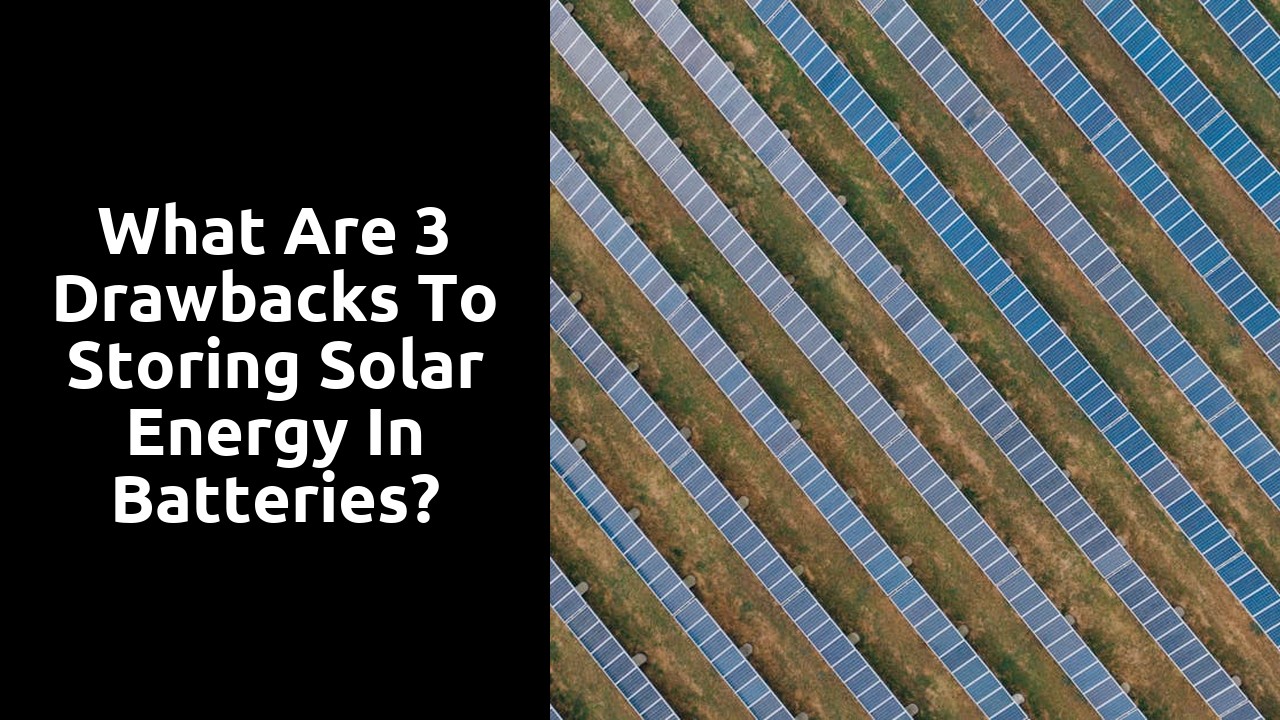
Table Of Contents
Safety Risks
Safety risks are a significant concern associated with solar battery storage solutions. One of the primary safety risks is the potential for thermal runaway, a phenomenon that can lead to fires or explosions. This risk is particularly heightened in lithium-ion batteries commonly used in solar energy storage systems due to their chemical composition and susceptibility to overheating.
Additionally, improper installation or maintenance of solar battery systems can increase the risk of electric shock or short circuits, posing dangers to both property and individuals. These safety risks highlight the importance of ensuring that solar battery storage solutions are installed and maintained by qualified professionals following stringent safety protocols to mitigate potential hazards.
Potential Fire Hazards
Potential fire hazards are a significant concern associated with storing solar energy in batteries. Due to the chemical composition of lithium-ion batteries commonly used for this purpose, there is a risk of thermal runaway, where the battery overheats and catches fire. This risk is particularly heightened in large-scale solar battery storage solutions, where a single malfunctioning unit could trigger a chain reaction leading to a dangerous fire.
In addition to the risk of thermal runaway, improper installation, maintenance, or ventilation of solar battery storage solutions can further increase the likelihood of fire incidents. Poorly designed or faulty systems may lead to electrical malfunctions, short circuits, or overheating, all of which can potentially ignite a fire. It is crucial for users and installers to strictly adhere to safety guidelines and regulations to minimise the risk of fire hazards when implementing solar battery storage solutions.
Recycling and Disposal Challenges
Recycling and disposal challenges pose significant obstacles in the realm of solar battery storage solutions. As the demand for renewable energy sources increases, the disposal of used batteries becomes a pressing concern. The materials within batteries, such as lithium, can be harmful to the environment if not disposed of properly.
Moreover, the recycling process for these batteries can be complex and costly. Currently, there is a lack of streamlined methods for efficiently recycling solar batteries, which contributes to environmental concerns. As technology advances and more batteries reach the end of their lifespan, finding sustainable solutions for recycling and disposal will be imperative in mitigating the negative impacts of solar battery storage solutions on the environment.
Environmental Impact of Battery Waste
When it comes to solar battery storage solutions, one of the major drawbacks lies in the environmental impact of battery waste. As the demand for renewable energy sources grows and more solar panels are installed, the need for batteries to store this energy increases as well. However, the disposal of these batteries poses a significant challenge due to the toxic materials used in their production. This results in potential pollution of soil and water sources if not managed properly.
Furthermore, being a relatively new technology, the recycling process for storing solar energy in batteries is still in its early stages. Efforts are being made to improve the recyclability of batteries, but the process can be costly and not all components can be effectively recycled. This leads to concerns about the long-term sustainability of solar battery storage solutions and the environmental impact of the waste they generate.
Dependence on Battery Technology
Dependence on battery technology poses a significant challenge in the realm of solar energy storage. As the efficiency and reliability of solar battery storage solutions heavily rely on advancements in battery technology, any limitations or setbacks in the development of batteries could impede the progress of solar energy systems. In essence, the success of solar energy as a dependable source of power is intertwined with the pace of innovation in battery technology.
Moreover, the reliance on batteries for storing solar energy highlights the risk of technological obsolescence. With the rapid pace of advancements in battery technology, there is a potential for current solar battery storage solutions to become outdated or inadequate, leading to the need for frequent upgrades and replacements. This constant cycle of technological evolution not only poses financial implications for solar energy consumers but also raises concerns regarding the sustainability and longevity of solar energy systems in the face of ever-evolving battery technologies.
Rapid Technological Advancements
The rapid technological advancements in solar battery storage solutions have both positive and negative implications. On one hand, the continuous innovation in battery technology is exciting as it can lead to more efficient and cost-effective solutions for storing solar energy. As advancements progress, the potential for increased storage capacity and longer battery lifespans becomes more promising, offering consumers better options for harnessing and using solar power.
However, the fast-paced nature of technological progress also presents challenges for consumers investing in solar battery storage solutions. The risk of their purchased batteries quickly becoming outdated or inferior to newer models can be a concern. With the industry constantly evolving, consumers may face the dilemma of either sticking with their current system or upgrading to a more advanced one, potentially incurring additional costs and contributing to electronic waste through the disposal of their outdated batteries.
FAQS
What safety risks are associated with storing solar energy in batteries?
Storing solar energy in batteries can pose safety risks such as overheating, short circuits, and potential leakage of hazardous materials.
What are the recycling and disposal challenges of batteries used to store solar energy?
The recycling and disposal of batteries used to store solar energy can be challenging due to the presence of toxic materials like lead and lithium, which can harm the environment if not disposed of properly.
How does storing solar energy in batteries contribute to the environmental impact of battery waste?
Storing solar energy in batteries can contribute to the environmental impact of battery waste by increasing the volume of hazardous waste that needs to be managed and disposed of responsibly.
What is the dependence on battery technology when storing solar energy?
Storing solar energy in batteries creates a dependence on battery technology, which can become a drawback as the rapid advancements in technology may lead to the obsolescence of current battery systems.
How do rapid technological advancements affect the storage of solar energy in batteries?
Rapid technological advancements can impact the storage of solar energy in batteries by making current systems outdated quickly, leading to potential inefficiencies and the need for frequent upgrades.
